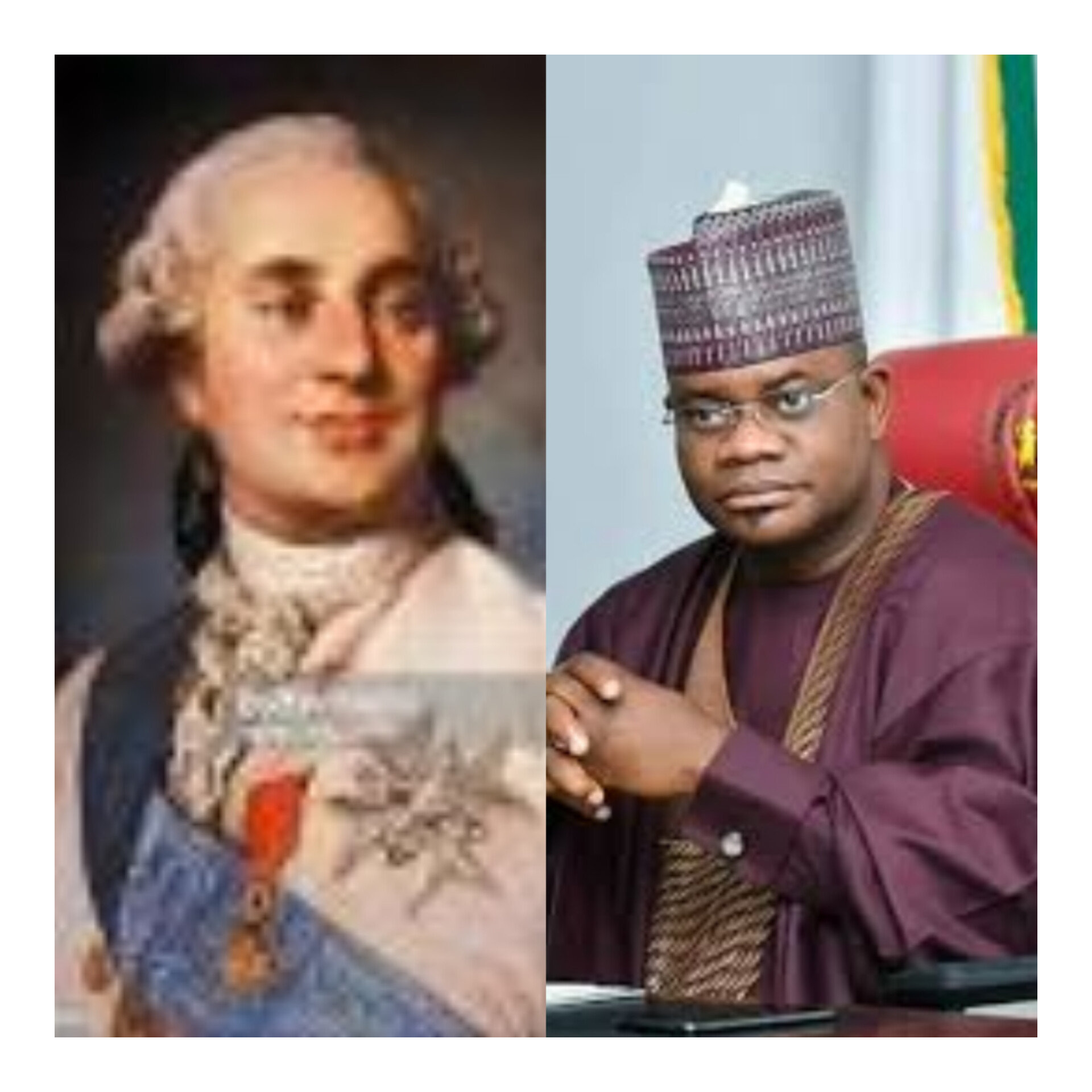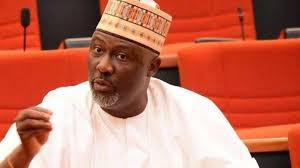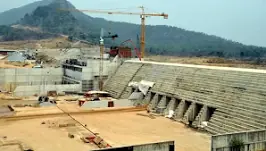By Tunde Olusunle
Since he became governor in circumstances which remain fuzzy over seven years ago, Yahaya Bello, the governor of Kogi State, has left no one in doubt about his totalitarian grip on the north central state. He is the be-all-and-end-all of the potentially rich, but pathetically indigent and decrepit state, whose style reminds of that of the infamous King Louis XIV in French history. Louis XIV it was who boastfully declared in 1655: L’Etat, c’est moi, meaning “I am the state; the state, that is me.” That phrase denotes absolute monarchy and absolutism, the type Yahaya Bello has typified in his tour of duty as default governor of Kogi State. Default, yes because of the uncanny ingenuity with which he inherited the votes and mandate of the actual contestant for the governorship who was coasting home but died mysteriously before being adjudged winner.
And since his inauguration January 2016, Bello’s administrative style, has been unequalled both in the political history of Kogi State, and unparalleled elsewhere since the dawn of the Fourth Republic. For a state which is primarily sustained by the civil service and teaching employees, life has never been as dreary, rough, tortuous and despairing. Bello’s government entered the Guinness Book of Records within one year of his ascendancy as one which paid hapless civil servants incomprehensible percentage salaries! Senior bureaucrats receive bank notifications on their handheld devices informing them that N18,500 has been credited to their accounts as their take home salaries for a month!! It’s been that horrendous under Bello. Please put a call through to Kogi State. And kindly take the statistics of automobiles hitherto owned by civil servants, now dust-caked furniture at the front approaches of many homes in the state capital and other communities.

If the situation is this bad for public servants in the employment of the state government, the plight of local government employees is best imagined. The Joint Account Allocation Committee, (JAAC), which polls resources from the Federation Accounts Allocations Committee, (FAAC), cannibalises the funds at the level of the state governments and reverts measly tokens to the local government areas, (LGAs). Chairmen at that level simply pocket their own bits, the ubiquitous “security votes” and exhort their employees to “go back to land” and farm. Same way hopelessness, desperation and depression pervade the state level, gloom, doom, despair parade the alleys and bush paths of our localities.
The voices of the people have been so stifled under the Nebuchadnezzar -style governance in Kogi State, that people only discuss their conditions in muffled tones. Suicide cases were on the upsurge at some point in time, when individuals who had built their lives on their careers in public service, suddenly found themselves naked and exposed in literal terms. The inability to foot basic obligations like medical expenses, maternity bills, house rents, payment of school fees and examinations bills for their children and wards, have unwittingly humiliated many parents under Yahaya Bello’s grimace. Juxtaposed with the regimes of all of Bello’s predecessors: Abubakar Audu, Ibrahim Idris and Idris Wada, Kogi State has never had it so bad.
On the flip side, Bello, his family and associates are savouring safari rides of a lifetime. Rashidat Bello, said to be the governor’s senior wife, was captured on camera last year, gifting her personal aides with pack of cash. Each of her officials, security, protocol, domestic and so on, received cash gifts of one million naira each. A news story noted that Mrs Bello’s bazaar was a follow-up to an earlier exercise where she presented automobiles to her officials for hardwork and loyalty. All of these are happening in a state where not too many people are sure of one meal a day. In February this year, the same Rashidat Bello flaunted a Mercedes-Maybach S-Class Luxury Sedan 2022 edition, said to be valued at N200 million. Bello by the way, is polygamous with other wives. It is either they are genuinely conservative, or information about their closets are not as yet in the open.
Amidst all of these, Yahaya Bello’s proxies were last December, arraigned for fraud to the tune of N10 Billion. Bello’s nephew, Ali Bello and one Dauda Sulaiman, were arraigned before Justice James Kolawole Omotoso of the Federal High Court, Maitama, Abuja, on a 10-count charge of misappropriation and money laundering. It is very strongly believed that the money in question belongs to Kogi State, especially because a third suspect in the saga, Abdulsalami Hudu, hitherto a Cashier in Government House, Lokoja, is on the run. Very conspicuously, Ali Bello and Rashidat Bello also feature in yet another three billion naira matter being prosecuted by the Economic and Financial Crimes Commission, (EFCC).
Mrs Bello, named as an accomplice in the heist, was said to be on the run, while Ali Bello, Abba Adauda, Yakubu Siyaka Adabenege and Iyada Sadat were docked before Justice Obiora Egwuatu of the Federal High Court in Abuja, also for money laundering and misappropriation. The December 2022 and February 2023 episodes seemingly had the imprimatur of Yahaya Bello, given the involvements of his wife and nephew. Following a similar pattern, the funds so misappropriated were purportedly being converted into foreign currency, in various bureau de change in Abuja. Such has been the lot of resources legitimately belonging to Kogi State, whose people thirst and hunger, while their entitlements are being tossed about like Russian roulette.
Yahaya Bello recently accentuated his proprietorship on Kogi State, in the run up to the November 2023 gubernatorial election. Singlehandedly, he picked the candidate for his party, the All Progressives Congress, (APC), Ahmed Usman Ododo, the little known auditor-general for local governments in the state. Ododo is reputed as the “executioner-in-chief” in the impoverishment of local government workers many of whom lost their jobs and livelihoods in a mean-spirited and scurrilous “staff verification exercise” conducted in the early years of the Bello government. Ahead of the gubernatorial primary, Bello paid for the nomination forms of every aspirant to the office who served in his administration at state expense. This was to create a facade of provided a level playing field for them all contenders, before pulling out his joker. It is bad enough that Bello has demonstrated insensitivity to the loud clamour for the rotation of the governorship. It is the height of nepotism in the multicultural, multilingual “confluence” state that he has just put forward his first cousin for the top job in the state. Besides being a political neophyte and paperweight, Ododo’s naivety and provinciality sparkle from his visage.
Since the inception of the state in 1991, its politics has been dominated by the preponderantly Igala-speaking Kogi Eastern part of the state. The zone produced three governors in succession and logged over 18 years at the helm. Bello’s Ebira kinsmen in Kogi Central zone, had been joined in advocacy for power rotation with the Okun Yoruba-speaking Western zone, for power shift. Bello’s fortuitous ascent it was assumed, had opened a window to the reordering of the existing power imbalance in the state. But Bello thinks otherwise. His politics is that of “winner takes all.” To this effect, Bello is saying that the Ebiras aspire to retain power in 2024, possibly all the way to 2032!
It would seem that Bello has always had a nepotistic streak, by the way. With the benefit of hindsight, the “choicest” appointments in his government are not just from Kogi Central, they are from his home local government area, Okene. This has been so skewed as to “empower” his own kinsfolk even within the framework of the sociopolitical dynamics of his senatorial zone. His Chief of Staff; Commissioners for Works and Housing; Justice; Rural Development; Accountant-General; Chairman, State Pensions Board; Senator representing Kogi Central, are all from Okene. Yet, Kogi Central has three other Ebira-speaking LGAs, as well as the non-Ebira Ogori-Magongo area, making a total of five local governments in the senatorial zone.
Emboldened by the same faith Bola Tinubu/Kashim Shettima presidential ticket, Bello has prescribed a similar template for his puppet. Ododo will be running with Sulaiman Abubakar from Kogi East. This is in spite of the dominant Christian population in the seven local governments in Kogi West, and the nine in Kogi East. Every preceding democratic ticket, beginning with Abubakar Audu’s, Third Republic ticket in 1992, has always respected the religious plurality of the state. Audu ran with Samuel Akande from Kogi West in 1992, and thereafter with Patrick Adaba from Kogi Central in 1999. Idris paired Philip Salawu in 2003 and 2007, while Wada ran with Yomi Awoniyi in 2012.
At a time when Yahaya Bello was opportuned to stand up to be counted as truly professing new thinking consistent with the duplicitous “new direction” slogan his administration professes, he has failed this preliminary test. The November 2023 polls would have been his greatest opportunity to demonstrate his unequivocal subscription to political equity, fairness and justice. Indeed, if he were a student of history in the faintest sense, he would have recalled that his “grandfather” figuratively, Adamu Atta who hailed from his very homestead in Okene, was democratically elected governor in the old Kwara State, during the Second Republic. This was at a time when the Ebiras were a minority in the political calculus of the erstwhile state. Kwara State at the time was overwhelmingly dominated by Yoruba-speaking ethnicities, but in the spirit of political sensitivity and accommodation, the electorate rallied behind Adamu Atta. Atta was in office from October 1979 and October 1983. Conversely, both in the old Kwara and present day Kogi states, the Okun-Yoruba have never substantively made it to the seat of chief executive.
Happily, democratic pluralism has offered alternative platforms to political enthusiasts to pursue their aspirations. It is noteworthy that three Okun sons are in the fray for the coming gubernatorial debacle. Little known Olayinka Braimoh; Leke Abejide who has just won reelection into the House of Representatives and Dino Melaye, who previously traversed the lower and upper parliaments variously, are in the contest. They are representing the Action Alliance, (AA); African Democratic Congress, (ADC) and the Peoples’ Democratic Party, (PDP), respectively. Each of the parties comes with peculiar attributes in terms of age, structural spread, voters’ perception, among other attributes. Relatively new parties have been known to spring surprises like the Labour Party, (LP) and the Young Peoples’ Party, (YPP) in our recent political experience. Despite having previously sat in the driver’s seat for nearly two decades, Kogi East is not letting up about the governorship either. At least half a dozen candidates from the zone, are flying the flags of various political parties at the off-season November poll.
This indeed may be a very good opportunity for Okunland to upstage Yahaya Bello and by so doing, put him where he rightly belongs. Remember the old adage that “he who the gods want to destroy, they first make mad?” Bello’s rule book of menacing intimidation, crude coercion and gun violence, cannot subsist and succeed for all time. Even among his kinsmen, Yahaya Bello’s impunity vis-a-vis his sole imposition of Ododo, does not sit well. His preference has bred quiet discontent amongst many of his former loyalists who are all playing the folkloric lizard. The belly of the reptile cannot be fathomed because of the peculiar manner of its posturing. Some of these malcontents are waiting to exact their pound of flesh at the appropriate time. Rigorous thinking, meticulous planning, deft strategising, consensus building and efficient execution can yet bring down the pseudo-monarch from his horse back of straw.
Tunde Olusunle, PhD, poet, journalist, scholar and author is a Member of the Nigerian Guild of Editors, (NGE)




